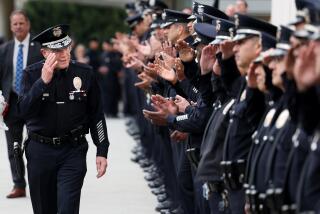COLUMN RIGHT / LOU KOVEN : Scavengers Go After the Men in Blue Again : Rioting renewed support for police. But critics have renewed efforts to get the LAPD.
A dismaying number of political leaders insists on blaming the inferno of lawless behavior on the flaws of society and the Los Angeles Police Department, as if to say that criminals bear no responsibility for their acts.
Many of these people have blamed the savagery and violence that we witnessed on television on the government’s inability to deal with the tremendous number of social problems in our communities. They also have claimed that the police bear a great deal of blame for this disturbance.
While there has not been enough time to fully study the factors that led to the riots, numerous studies in the past 20 years have shown that the threat of penalty and personal responsibility play the greatest role in influencing the crime rate.
Many politicians, the media and myriad social critics see crime as a direct result of poverty. If this hypothesis were correct, it would follow that as the poverty rate falls, the amount of crime would decrease. Statistics prove that this theory is incorrect. For the period from 1960 to 1989, while the poverty level in the United States fell from 22% to 12.8% (a 42% decrease), the rate of violent crime rose a frightening 737%. And in other countries that share similar levels of development, like Britain, lower violent-crime rates exist. Clearly, the “society-at-fault” theory does not hold true, and it also fails to recognize the vast number of people born into poverty who grow up to become law-abiding citizens.
Having talked to and arrested thousands of people in my 18 years with the LAPD, I have found that criminals are influenced by the risks and rewards of crime; they are not inexorably driven to crime by economic plight. Most of us, poor or not, have adopted a set of values that respects the rights and belongings of others. Criminals have not developed such respect. By increasing not only the penalties, but also the likelihood of such penalties being applied, we can reduce the temptation to engage in crime and antisocial behavior. We must also act to reduce poverty in our society, but this is because it is an affront for some of us to suffer in this nation of plenty.
At the same time that many “community” leaders were blaming the rioting on the flawed social system, an equal number were attributing the violence to the LAPD. It was not too long ago that the LAPD was the pride of the city. This, after all, was the department that inspired “Dragnet” and “Adam 12” and gave us the notion of police work as an honorable profession.
But something unfortunate happened. Numerous LAPD officers were videotaped during the course of arresting a combative suspect. The integrity, trust and goodwill of the department--earned through decades of good police work--evaporated virtually overnight. And when the four officers charged with the misdoings were acquitted for carrying out their sworn duty, violence erupted. The LAPD was perceived as the culprit, and the wrath of thousands of malcontents was directed at the men in blue.
The rage generated by the verdicts in the Rodney King case opened the door to opportunists who terrorized Los Angeles for many days and nights. Despite the LAPD being the purported cause of this torrent of crime, the citizens of the city looked for the police to answer the call and quell the unrest. Suddenly, in the course of a few hours, a police patrol car once again became a welcome sight to most of the city’s residents. Once again, law-abiding citizens found reason to appreciate the selfless duty that each officer carried out in this unparalleled time of need.
Now, in the wake of this civic nightmare, the scavenger-like critics are again picking at the performance of the LAPD. After originally blaming the police for inciting the riots because of their overzealous use of force, critics now cite the department for extending this period of terror because it practiced too much restraint. This dichotomy of opinion from uninformed, self-appointed police-tactics experts points directly at how little credibility their commentary should be afforded.
The community must come to realize that poverty and the actions of the LAPD were not the root causes of the widespread looting, arson, thievery and brutality. To believe this misconception would call into question the morality and ethical nature of every law-abiding citizen who lives below the poverty level as well as the integrity of the officers who have protected the safety of millions of people for decades. The riots of 1992 were the result of an amalgamation of various problems in our system. In the next few days, months and even years, all of our efforts should be aimed at solving these complex problems, not pointing fingers and passing the buck.
More to Read
Sign up for Essential California
The most important California stories and recommendations in your inbox every morning.
You may occasionally receive promotional content from the Los Angeles Times.










